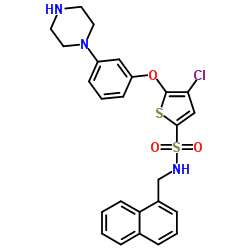1261576-81-1
| Name | 4-Chloro-N-(1-naphthylmethyl)-5-[3-(1-piperazinyl)phenoxy]-2-thiophenesulfonamide |
|---|---|
| Synonyms |
4-Chloro-N-(1-naphthylmethyl)-5-[3-(1-piperazinyl)phenoxy]-2-thiophenesulfonamide
MFCD28100813 |
| Description | B355252, a phenoxy thiophene sulfonamide small molecule, is a potent NGF receptor agonist. B355252 potentiates NGF-induced neurite outgrowth. B355252 protects ischemic neurons from neuronal loss by attenuating DNA damage, reducing ROS production and the LDH level, and preventing neuronal apoptosis. B355252 has anti-apoptotic effects in glutamate-induced excitotoxicity, as well as in a murine hippocampal cell line (HT22) model of Parkinson disease (PD)[1]. |
|---|---|
| Related Catalog | |
| In Vivo | B-355252 (0.125 mg/kg; ip; daily; 3 days) significantly attenuates the infarct volume and protects post-stroke neuronal loss in adult male Sprague–Dawley rats with cerebral ischemia[1]. |
| References |
| Density | 1.4±0.1 g/cm3 |
|---|---|
| Boiling Point | 718.4±70.0 °C at 760 mmHg |
| Molecular Formula | C25H24ClN3O3S2 |
| Molecular Weight | 514.059 |
| Flash Point | 388.3±35.7 °C |
| Exact Mass | 513.094788 |
| LogP | 6.01 |
| Vapour Pressure | 0.0±2.3 mmHg at 25°C |
| Index of Refraction | 1.666 |
| Symbol |

GHS06 |
|---|---|
| Signal Word | Danger |
| Hazard Statements | H301-H315-H319-H335 |
| Precautionary Statements | P261-P301 + P310-P305 + P351 + P338 |
| RIDADR | UN 2811 6.1 / PGIII |
